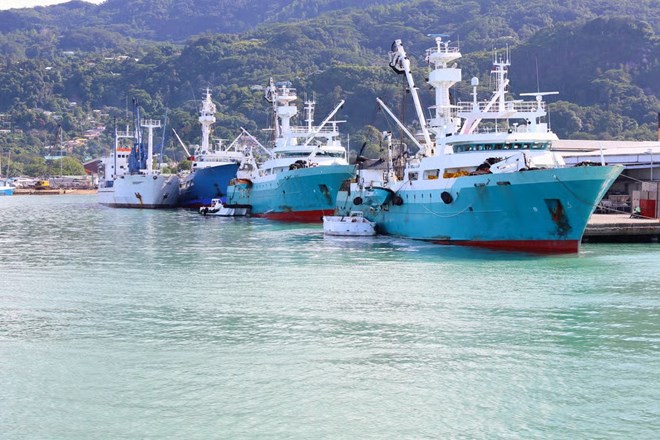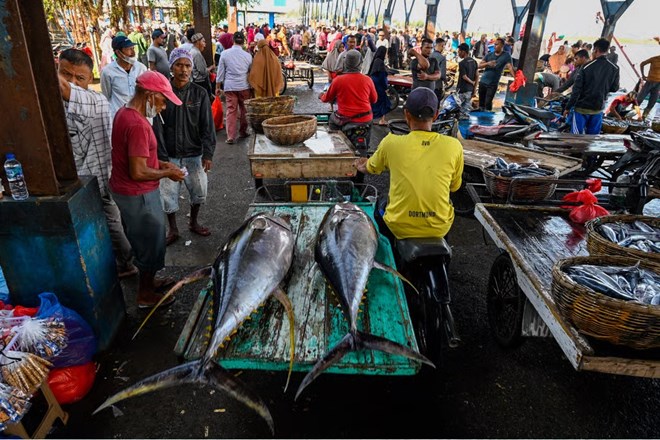
Monday May 8, 2023
BY ANTOANETA ROUSSI AND LOUISE GUILLOT
Critics say the bloc is leveraging sustainability aid to block a ban on practices that cause overfishing.
EU vessels — most of them French or Spanish — catch up to a third of tuna in the Indian Ocean, according to the Indian Ocean Tuna Commission | iStock
The EU’s sustainable fishing funds are intended to save the environment. In the Indian Ocean, critics say they’re being used as leverage to allow Europe’s fishing fleets to keep fishing vast amounts of tuna.
EU vessels — most of them French or Spanish — catch up to a third of tuna in those waters, according to data from the Indian Ocean Tuna Commission (IOTC), an international body tasked with managing the fisheries. To do so, they deploy so-called fish aggregating devices — floating objects made of plastic or wood used to attract fish — that scientists say lead to overfishing and cause plastic pollution.
Concerned by the EU’s practices, a group of 11 IOTC member countries are calling to limit the use of floating devices to allow fish to recover and ensure the species’ survival. Their proposal calls for a 72-day moratorium on the practice every year, and a limit on how many devices can be used.
The EU has launched a campaign to ensure that doesn’t happen.
Through so-called “sustainable fisheries partnership agreements” with countries, the EU is funneling millions of euros in developmental aid to countries that are also members of the IOTC and can help the EU block the proposal.
“The EU doesn’t want to be restricted [in the Indian Ocean],” said a member of a country delegation pushing for the regulation of the floating devices, who requested anonymity to speak freely. “They want to maintain their amount of catches, which are very big.”
Marco Valletta, head of the EU delegation, insists the proposal to limit floating devices “clearly violated the playing field” and was dictated more by “the commercial interests of a group of countries … than by serious and sincere conservation objectives.”
The proposal includes a condition that if the IOTC’s scientific committee is unable to provide advice, the proposed 72-day ban would come into force as “a precautionary approach.” The EU says it should only come into effect if there is enough strong scientific evidence in favor.
“We were really stunned to see the stiff opposition from the EU,” as the bloc usually champions a precautionary approach in other settings, said Hussain Sinan, a Maldivian post-doctoral researcher.
Bartering
The EU’s delegation at the IOTC is by far the heftiest, with 40 delegates; the second largest is Indonesia with 20. Of its 40 representatives, at least 24 are industry lobbyists, according to ocean conservation NGO Bloom.
The bloc’s delegates stand out in their smartly pressed suits, open shirt collars and air of bravado, recalled a delegate who attended the IOTC Commission meetings as an observer for over a decade.
Together with representatives from the European Commission, the delegates have been lobbying hard against a ban on floating devices.
The EU currently has two active fisheries agreements with IOTC member countries: a €5.3 million deal with the Seychelles, which docks most of the EU’s tuna-fishing fleet, and a €7 million agreement with Madagascar.
It also has a separate “blue economy” partnership with the government of Kenya worth €24 million, and one with Tanzania for €180 million.
“The EU has always suffered from a violent duality between its development aid policies and its commercial strategy,” said Bloom in a January report. “On one hand, it provides financial aid to help countries — a lot of which are former European States’ colonies — to develop. On the other, its own delegations impede economic development and oppose environmental protection measures.”

Large fishing boats docked in the Seychelles | iStock
These fisheries partnerships allow the EU to buy access to countries' waters so that its vessels can fish surplus stocks. Critics see them as a source of leverage for the EU to increase its influence in the region, but the Commission says they "focus on resource conservation and environmental sustainability" and are "a benchmark for good fisheries governance."
Accusations that the agreements are being used as leverage are "totally unfounded," a Commission spokesperson said in an emailed statement. "The EU respects the position of other countries and does not use agreements it has ... to influence their position or force them to support in multilateral fora."
Change of direction
The most dramatic moment in the talks so far came in February, when Kenya — until then the proposal’s key backer — suddenly dropped its support.
During a meeting at the Pride Inn Hotel in Mombasa, Kenya’s blue economy minister, Salim Mvurya, stood up in front of the delegates and announced that his country was withdrawing its proposal for a ban, which national delegations had been debating for more than a year.
There was an audible gasp in the room, according to five people who attended the meeting.
“It was really a big surprise for all of us and immediately we called for a time out,” said a delegate from a country east of the Indian Ocean that supported the ban. “The situation was chaos.” The Kenyan delegation looked as surprised as everyone else, according to the people who were present.
After more than five hours of talks, Indonesia — with the backing of Somalia, India, Australia and South Africa, among others — took over as lead country and suggested a secret ballot on the proposal, a highly unusual move that speaks to how contentious talks had become.
While more than two-thirds of countries voted in favor of the proposal, the Seychelles objected, along with Comoros, Oman, Kenya and the Philippines.
The proposal passed, meaning it should be adopted by IOTC members. But according to the organization's rules, any country that objects within 120 days does not have to apply the measure. Since the EU is the greatest user of floating devices, and objected, environmentalists say it would do little in helping the fish stock replenish.
Counterproposal
At a meeting starting May 8, the IOTC will discuss an EU counterproposal pushing back against the Indonesian-led initiative.
The proposal would jettison the 72-day ban and offer a way to increase the number of the floating devices allowed at sea. It also calls on the IOTC scientific committee to assess whether using these devices contributes to a higher mortality of juvenile tuna and to provide recommendations on the management of this gear by the end of the year.
The Commission spokesperson said the EU is "clearly in favor" of a stronger management of fish aggregating devices and that its counterproposal would "allow for better control" and better implementation. It also wants scientific input to find "the best moment, area and modality where a closure on [the devices] could be the most beneficial for the tuna stock."

Yellowfin tuna at a fishing port in Banda Aceh, Indonesia. The country has now taken the lead among ITOC member countries amid calls for a temporary tuna fishing ban | Chaideer Mahyuddin/AFP via Getty Images
Industry association Europêche’s tuna director, Anne-France Mattlet, said European tuna fishers weren’t against a temporary ban but want the scientific committee to make that judgment. "Maybe it will turn out that the [ban] is not necessary at all at this time of the year, or it can be at another time," she said.
The 72-day ban is seen by its proponents as a last-ditch attempt to prevent the species from extinction. Other tropical waters around the world have already instituted bans on fish aggregating devices over concerns about overfishing — boosting the case for one in the Indian Ocean.
Yellowfin tuna was designated as overfished in 2015; IOTC members have since tried to find ways to help its stock repopulate, including by implementing catch limits.
Those efforts ultimately failed, because countries did not respect the catch limits.
The goal is to “ensure that the ecological impacts are reduced,” said WWF Indian Ocean tuna manager, Umair Shahid. “It would give a chance for juveniles to grow, especially during the peak season to allow for stock recruitment."
For some countries, the proposal is also about ensuring all states have an equal right to fish the stocks; the EU currently scoops up the majority thanks to its use of floating devices.
Mohamoud Badrudiin, director-general of Somalia’s fisheries ministry and head of the Somali IOTC delegation, said the war-torn country voted in favor of the proposal as it can’t afford to see tuna stocks dwindle any further.
Five consecutive failed rainy seasons have caused a prolonged drought with millions of livestock deaths, child malnutrition and mass migration — increasing Somalia’s reliance on fishing.
“Those people who are already suffering from drought, they have only seafood left,” he said. “Industrial fisheries are trying to exploit the fact that we have a low enforcement capacity, and to do that to these people is inhumane.”